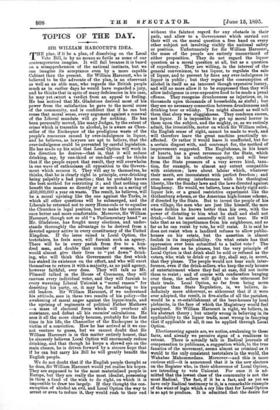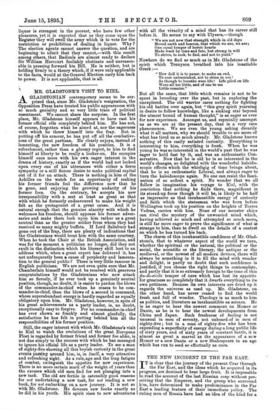TOPICS OF THE DAY.
SIR WILLIAM HARCOURT'S IDEA.
T"plan, if it be a plan, of dissolving on the Local Veto Bill, is by no means so futile as some of our contemporaries imagine. It will fail because it is based on a misapprehension of the national instincts, but we can imagine its acceptance even by a more capable Cabinet than the present. Sir William Harcourt, who is believed to be the advocate of the plan, is an observant as well as an able man, who regards the British people much as in earlier days he would have regarded a jury, and he thinks that in spite of many deficiencies in his case, he may yet extort a verdict from an appeal to feeling. He has noticed that Mr. Gladstone derived most of his power from the satisfaction he gave to the moral sense of the community, and is confident that if he can but rouse that moral sense, every argument against a renewal of the Liberal mandate will go for nothing. He has been personally moved, like many Judges, by the extent of crime which is traceable to alcohol, he is aware as Chan- cellor of the Exchequer of the prodigious waste of the people's resources caused by over-indulgence in liquor, and he believes, as lawyers are apt to believe, that the over-indulgence could be prevented by careful legislation. He has made up his mind that Local Option will work in the direction he desires—that is, that it will reduce drinking, say, by one-third or one-half—and he thinks that if the people expect that result, they will overwhelm in one wave of enthusiasm all opposition to the Govern- ment which secures it. They will say to themselves, he thinks, that he is clearly right in principle, over-drinking being palpably a bad practice ; that he probably knows the best method for restricting it ; and that nothing can benefit the masses so directly or so much as a saving of £50,000,000 a year on waste. The result, he believes, will be a moral uprising like the one against the Turks, in which all other questions will be submerged, and the Liberals be returned not to carry Home-rule or to equalise the Churches in legal position, but to make the nation at once better and more comfortable. Moreover, Sir William Harcourt, though not so old " a Parliamentary hand " as Mr. Gladstone, has fought many elections, and under- stands thoroughly the advantage to be derived from a devoted agency active in every constituency of the United Kingdom. If the issue raised is Local Option, the teetotalers, he feels sure, will furnish such an agency. There will be in every parish from five to a hun- dred men, and double that number of women, who would almost give their lives to " put down " drink- ing, who will think this Government the first which has staked its existence on the effort, and who will exert themselves to return it with a majority, as no paid agency, however faithful, ever does. They will talk as Mr. Plimsoll talked in the House of Commons, they will canvass every individual voter, and they will furnish to every wavering Liberal Unionist a "moral reason" for deserting his party, or, it may be, for adhering to his old leaders. Sir William Harcourt, if we understand his attitude, sees in these two results of his policy—the awakening of moral anger against the liquor-trade, and the uprising of regiments of political Father Mathews —a mass of electoral force which will overbear all resistance, and defeat all his enemies' calculations. He sees it all the more clearly because, probably for the first time in his life, the Chancellor of the Exchequer is the victim of a conviction. How he has arrived at it we can- not venture to guess, but we cannot doubt that Sir William Harcourt is in this matter entirely honest, that he sincerely believes Local Option will enormously reduce drinking, and that though he keeps a shrewd eye on the main chance, he is driven forward by a sincere hope that if he can but carry his Bill he will greatly benefit the English people.
We do not doubt that if the English people thought as he does, Sir William Harcourt would yet realise his hopes. They are supposed to be the most materialised people in Europe, but they are really the most idealist, possessing in them a fund of the wish to do right, on which it is impossible to draw too largely. If they though] the con- sumption of alcohol an evil, and Local Option the way to arrest or even to reduce it, they would rush to their end without the faintest regard for any obstacle in their path, and allow to a Government which carried out their will on the moral question a free hand on every other subject not involving visibly the national safety or position. Unfortunately for Sir William Harcourt, the mass of the people are entirely unconvinced of either proposition. They do not regard the liquor question as a moral question at all, but as a question of expediency. They are willing, in the interest of the general convenience, to tax liquor, to regulate the sale of liquor, and to prevent by fines any over-indulgence in liquor in public ; but they regard the consumption of alcohol in itself as an innocent though expensive luxury, and will no more allow it to be suppressed than they will allow indulgence in over-expensive food to be made a penal offence. They recognise drunkenness as injurious, or, in thousands upon thousands of households, as sinful ; but they see no necessary connection between drunkenness and drinking beer or whisky. You might almost as well tell them that sleep was sluggishness. They condemn excess, not liquor. It is impossible to get up moral horror in them upon the subject, and the mighty, or, as we entirely admit, the irresistible, motor on which Sir William relies, the English sense of right, cannot be made to work, and will therefore leave the great machine practically un- affected. Or rather it would leave it unaffected, but for a certain disgust with, and contempt for, the method of improvement suggested. The Englishman, in his heart of hearts, has a great reverence for the State, which is himself in his collective capacity, and will bear from the State pressure of a very severe kind, taxa- tion, for example, to almost any extent compatible with existence ; laws about labour which, whatever their merit, are inconsistent with perfect freedom ; and even some strong interferences with his theological liberty, like the Sunday laws and the laws directed against blasphemy. He would, we believe, bear a fairly rigid anti- liquor law, or a grand restrictive experiment like the Gothenburg scheme, or the American high-license scheme, if directed by the State. But to invest the people of his own village, the men who are just like himself, the men whose foibles he knows better than his own, with the power of dictating to him what he shall and shall not drink,—that he most assuredly will not bear. He will take that as an impertinence from his neighbours, and so far as he can resist by vote, he will resist. It is said he does not resist when a landlord refuses to allow public- houses on his estate, but the assertion is almost foolish in its inapplicability. On what estate has that oppression ever been submitted to a ballot vote ? The landlord does as he pleases, but the very principle of Local Option is that drink shall be sold or refused as the voters, who wish to drink or go dry, shall say, in secret, that they please. The people would not bear such inter- ference, even if the drink-sellers, who keep the only houses of entertainment where they feel at ease, did not incite them to resist ; and of course with confiscation hanging over them, the sellers will fight to the uttermost for their trade. Local Option, so far from being more popular than State Regulation, is, we believe, in- definitely more abhorrent, so abhorrent that if it were ever adopted, the result, in five-sixths of all the parishes, would be a re-establishment of the beer-houses by local plebiscite, in the face of which the Magistracy would feel paralysed. Sir William Harcourt is right, we believe, in his abstract theory ; but utterly wrong in believing in ita applicability to the liquor trade, most wrong in fancying that if applicable at all, it can be applied through Local Option.
Electioneering agents are, we notice, awakening to these facts, and already we perceive signs of a readiness to retreat. There is actually talk in Radical journals of compensation to publicans, a suggestion which, to the true fanatics of the movement, seems almost as criminal as it would to the only consistent teetotalers in the world, the Wababee Mahommedans. Moreover—and this is more curious still—it is announced that it is the new electors on the Register who, in their abhorrence of Local Option, are intending to vote Unionist. For once it is ad- mitted that the lowest class of the community is not the most Radical. The fact, if it be a fact, and as yet we have only Radical testimony to it, is a remarkable example of the want of logic which a cry like that for Local Option is so apt to produce. It is admitted that the desire for liquor is strongest in the poorest, who have few other pleasures, yet it is expected that as they come upon the Register they will swell the army which is to vote for the restriction or prohibition of dealing in liquor. Why ? The election agents cannot answer the question, and are beginning to admit that they cannot,—with this result among others, that Radicals are almost ready to declare Sir William Harcourt foolishly obstinate and unreason- able in pressing forward his Bill. He is neither, but is holding firmly to a theory which, if it were only applicable to the facts, would at the General Election carry him back to power. It is not applicable, that is all.



































 Previous page
Previous page